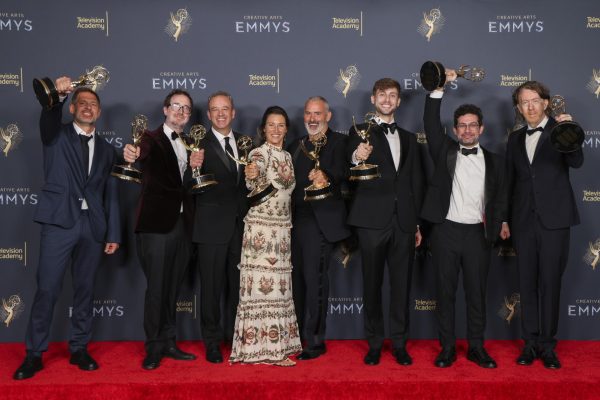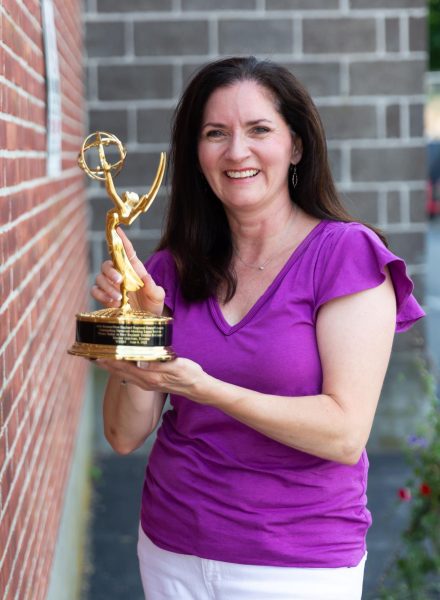On a hot July day this summer, Tyler Kinney ‘10 was riding his bike in Provincetown, Massachusetts, with his boyfriend when he found out that he was nominated for his first Emmy.
In the middle of Commercial Street, he saw his name in the “Outstanding Contemporary Costumes For A Series” category, recognition he had earned for his work as assistant costume designer on Apple TV+’s “The Studio”—a Seth Rogen and Evan Goldberg show that tied the record for the most nominations in a single year in the Comedy category.
“I was able to share it with everybody there in P-Town, and then the group text from “The Studio” was blowing up,” Kinney recalled. “I was very excited.”
Students at Emerson pursue their studies in the arts and communications hoping for success, recognition, and maybe even a shiny award or two after graduating. If history is any indication, that dream might not be out of reach.
This year alone, over two dozen alumni were nominated for their work in television at the Creative Arts and Prime Time Emmy Awards. Emerson alumni also received over 20 New England Emmy Awards for their work in broadcast journalism and marketing.
As a college, Emerson has an extensive catalog of notable alumni nominated for and awarded Emmys for their contributions to the arts and journalism, from cultural icon Jennifer Coolidge—who presented the award for “Outstanding Lead Actress in a Comedy Series” this year—to actor Henry Winkler, comedian Bill Burr and sitcom legend Norman Lear, the oldest person ever awarded an Emmy at the age of 98 in 2020, just to name a few.
Following the awards this year, The Beacon interviewed three Emersonian Emmy winners about their journey from college to the award ceremony, and the lessons they learned along the way.
In 2023, knowing the Emmy nominations had been released, Zach Rothfeld ‘12 checked the announcement page while on a work call. Under one of the last categories on the website “Outstanding Writing For A Nonfiction Program” he saw his name, nominated for his work as a writer on HBO Max’s docu-series “100 Foot Wave.” Rothfeld muted himself on the call immediately. He had begun to cry.

“I didn’t think that I cared about stuff like this. I was acting all cool before,” Rothfeld said. “But I just thought about…the amount of people that told me that I was something when I didn’t think I was, and I just started crying. I felt euphoric for days.”
This year, he was nominated a second time for the same series, now in its third season. This time he was recognized as an executive producer in the “Outstanding Documentary Or Nonfiction Series” category. And this year, Rothfeld won his first Emmy award.
The Emmy nomination had a deeper significance to Rothfeld than simply recognition of his work.
“Until that moment, I thought I was still interning,” Rothfeld said. “I still had the headspace of, like, ‘I’m an intern. I need to work my ass off. This could go away at any moment’—complete imposter syndrome.”
Rothfeld struggled with confidence when he started in Emerson’s film program. Taking chances and putting himself out there creatively was difficult for him, he said.
“I was so overwhelmed by how successful people seemed to be in college,” Rothfeld said. “These people were making student films and held themselves like they were Scorsese freshman year of college. It’s very intimidating.”
Ultimately, Emerson helped him grow. “I think that the growth that you’re forced into at Emerson is really helpful for when you graduate and you enter the real world, which is kind of what Emerson was, but just on a bigger stage.”
As a BFA theater design and technology student in the heart of the Theater District, Kinney’s time at Emerson prepared him to work in the industry after graduating.
“From that first semester of being at Emerson, you are either on production assignments, or you are learning little bits of everything that’s happening for a show and behind the scenes,” Kinney said.
At new student orientation in the Cutler Majestic Theatre, Kinney knew he had made the right decision in choosing Emerson.
“I said, ‘I’m surrounded by the right people. I’ve made it to my Hogwarts and this is going to be the people that I really connect with and can make things with,’” he said.
It was the tactile nature of the curriculum and extracurricular activities that first drew Marina Giordano ‘93 to Emerson as well. Giordano has won four New England Emmys for her work at WHDH Channel 7—two for “Best Directing” in 2000 and 2023, and two for “Best Newscast” in 2021 and 2022. She was told that if she chose Emerson, she would be touching video equipment her first week of classes.

“That was super appealing,” Giordano said. “And it was true. The first week of classes, we went to EIV [Emerson Independent Video], and I was touching equipment, instead of having to sit through at least a year of gen eds.”
At the end of her senior year, Giordano became the first female director for the EVVYs, the largest student-run collegiate award show in the nation. It was Giordano’s Emerson connections that helped her get a job at WHDH Channel 7, where she still works as News Director today.
“They needed more staff,” Giordano said. “So [my former classmate who worked at the station] called me one day and was like, ‘Come on over, we need a stage manager. Meet with my boss and see what happens.”
Rothfeld finally discovered a path for himself during his junior year when his sports public relations class gave him the opportunity to shadow Dr. Charles Steinberg as he ran PR for the Pawtucket Red Sox.
“I owe all of my storytelling success to [Steinberg] because he saw something in me really early, and he just kind of let me latch on with the team,” Rothfeld said.
The following summer, he interned for the baseball team to create scoreboard video entertainment. This is where Rothfeld learned how to keep the attention of 30,000 people in a stadium. Then, during his senior year, Rothfeld participated in the Emerson Los Angeles program, where his roommate first suggested he should intern for Mandalay Sports Media, a sports documentary company.
“I harassed, for lack of a better word, everyone that worked at this company on LinkedIn,” Rothfeld said. His persistence paid off, and he was offered an internship. Rothfeld attributes this opportunity in large part to the fact that the company had Emerson interns in the past who had performed well.
Kinney said everything leading up to the Creative Arts Emmys was very exciting, especially reuniting with his former colleagues from Boston, who had been part of the early stages of his journey.
“Getting to share that experience with people I had worked with since the very beginning of my career was so special,” Kinney said.
On the day of the ceremony, Kinney also reunited with “The Studio’s” costume and hair team, and they headed to the ceremony together. Once he was in L.A.’s Peacock Theater, Kinney said he had little time to process what was happening.
“They were announcing the category, and then when we won. It kind of became a little bit of a blur as we were moved from the stage through the backstage and got to meet the team from “The Penguin,” “Bridgerton,” and “Andor.” It was just super exciting,” Kinney said.
Rothfeld said when they announced his win, it felt so surreal he blacked out.
“[The award] felt like a culmination of everything that we had done on the series,” Rothfeld said, but it also had a deeper, personal meaning. “It’s a hunk of metal, but it can be the story that you prescribe to it. And for me, it was a lot of imposter syndrome—reversed.”
Giordano said these recognitions are important for many reasons, especially for journalists.
“The idea of the Emmys is that you’re being recognized by your peers,” Giordano said. “[Our work] is kind of grueling—-you wake up every day and you’re doing news and it’s not the most happy stuff. [The Emmys] allow us to actually celebrate what we’re doing and feel good about what we’ve done. Plus, it helps you to grow. It challenges you. It gives you something to strive for.”
Kinney said his time in the industry since graduating has been a roller coaster—from the SAG-AFTRA strike, to the changing television landscape with the advent of streaming, and COVID-19, but overall he remains optimistic about the future of the arts.
“Storytelling is such a collaborative art, and it does take people who are studying this craft and have mentors who are passing on their knowledge,” he said.
His advice to Emerson students is to continue to pursue what they love and to go after the work and collaboration.
“Find people that are succeeding and have a lot of knowledge and try to absorb that,” Kinney said. “Be their assistant, be their apprentice, because we can’t have that disappear. Make as many things as possible and just try to enjoy the art of being together with other people and telling stories.”
Rothfeld’s advice to Emerson students is simple: show care for your work.
“[Success comes] if you start out and just have an earnest care for the creative success of something, and you are obsessive over it being good. If you take a facet of the project out of the hands of the director because you care, you’re invaluable. You’re gonna get more responsibility, and you’re gonna have success.”
As he reflects on his Emmy win, he chooses to interpret it in his own way.
“All of these things, it’s how you treat them,” Rothfeld said. “My new challenge to myself moving forward is, ‘You don’t need to win an Emmy to have that reflection,’” Rothfeld said. “I need to just be better about knowing where I’m at while I’m at it.”
Though he has the prestige of the award now, he is still the same person who came to Emerson with ambition and a dream.
“You never grow out of the perspective you had when you go to Emerson for the first time,” Rothfeld said. “It’s all just a growth from that moment, but you’re never not that person. You’re just kind of extending yourself. I have these moments where that kid from 2013 is at the steering wheel now and it’s just like, ‘Wait, how did I get here?’”